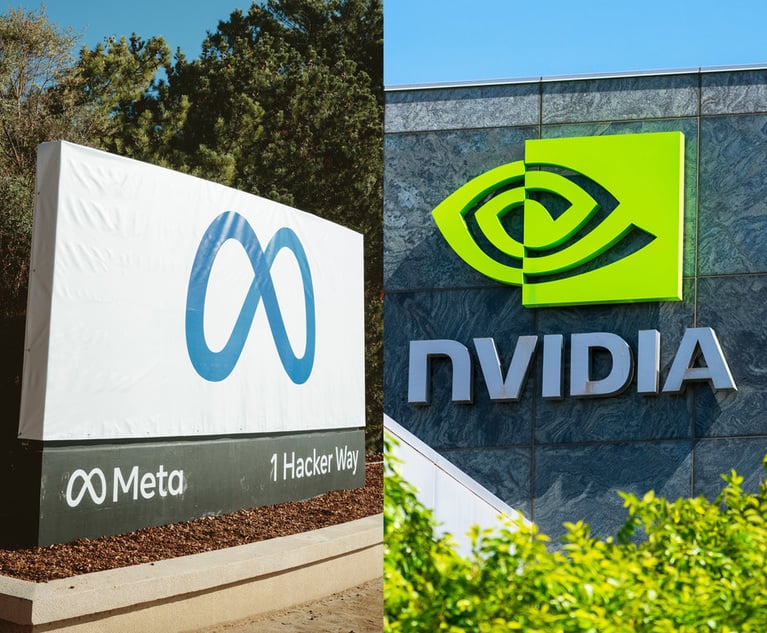CCPA Wants to Know Value of Consumer Data. So Do Businesses
The California Consumer Privacy Act requires companies to disclose the value that consumer data holds to their organization, but for many businesses, those numbers don't yet exist on paper or anywhere else.
June 30, 2020 at 10:00 AM
4 minute read
The original version of this story was published on Legal Tech News

On July 1, the California Attorney General's Office can begin enforcing the California Consumer Privacy Act. But some companies may still be struggling with one requirement in particular. The CCPA mandates businesses publicly disclose the value that consumer data holds to their operation. But chances are that many organizations don't have an exact dollar figure lying around somewhere.
The "financial incentives" requirement stems from a second round of CCPA revisions that were published by California's attorney general in March. It prohibits businesses from offering a different price or service based on a consumer's willingness to exchange personal data, unless that difference is "reasonably related to the value of the data."
Jarno Vanto, a partner at Crowell & Moring, used video streaming services as an analogy. Users with a standard subscription typically have to engage with some kind of advertising during their viewing experience, while those who wish to forgo commercials altogether will likely have to pay a higher monthly rate in order to compensate for the lost advertising revenue.
But when it comes to consumer data and the CCPA, businesses need consistent metrics or valuations in place in order to defend such a practice. "They actually have to give thought to it [and] document the process in order to justify why they are treating people who exercise their privacy rights differently from those that don't," Vanto said.
However, while data has become increasingly important to businesses situated across a variety of industries, that reality isn't necessarily reflected in an organization's cultural or accounting practices. Dominique Shelton Leipzig, co-chairwoman of Foley & Lardner's ad tech privacy and data management practice, indicated that many companies don't even list data on their accounting statements along with other intangible assets such as trademarks or copyrights.
"I have yet to see a client that has an accounting statement that reflects data that's not a data company," she said.
Companies may still be murky on the value of their data even as the CCPA's Wednesday enforcement data looms closer. Leipzig believes that many businesses were hopeful that the California Attorney General's Office would take into account the comments and feedback rendered by various trade groups and associations citing the novelty of the financial incentives requirement and asking for more time to comply.
So far, those hopes have gone unfulfilled and assembling data valuations from scratch likely isn't a project that can be accomplished in just a few days. Outside of the legal counsel businesses might be accustomed to working with on matters of CCPA compliance, Leipzig recommended that companies also engage the services of a third-party accountant to validate their valuation methodology.
"Initially, I would be surprised if you saw a lot of companies with actual dollar amounts in their valuations. I think what you'll see is an attempt to explain how data will be valued. And we think that's a sufficient explanation to start getting a handle on this in this evolving area," Leipzig said.
But exactly how much legal jeopardy an organization could face if it did come under regulatory scrutiny is unclear. Crowell & Moring's Vanto pointed out that given the variety of business interests at play that can impact the price or availability of a service, it may be difficult for the California attorney general to prove that a company discriminated against consumers who exercised privacy rights.
Still, he did raise the possibility of class action lawsuits centered around data valuations. "Inevitably, whatever dollar figure you come up with is going to be litigated at some point," Vanto said.
This content has been archived. It is available through our partners, LexisNexis® and Bloomberg Law.
To view this content, please continue to their sites.
Not a Lexis Subscriber?
Subscribe Now
Not a Bloomberg Law Subscriber?
Subscribe Now
NOT FOR REPRINT
© 2024 ALM Global, LLC, All Rights Reserved. Request academic re-use from www.copyright.com. All other uses, submit a request to [email protected]. For more information visit Asset & Logo Licensing.
You Might Like
View All
So You Want to Be a Tech Lawyer? Consider Product Counseling

Law Firms Mentioned
Trending Stories
- 1Attorney-Client Privilege: Recent Informative Decisions
- 2Here We Go Again: Trump and the Coming Civil Rights Storm
- 3'The Hubris of Big Tech': Apple Hit With California Labor Lawsuit for Alleged Free Speech, Privacy Violations
- 4Litigator of the (Past) Week: A $34.7M Defamation Win For Former Walmart Truck Driver
- 5A Major Bellwether for Trans Rights?
Who Got The Work
Michael G. Bongiorno, Andrew Scott Dulberg and Elizabeth E. Driscoll from Wilmer Cutler Pickering Hale and Dorr have stepped in to represent Symbotic Inc., an A.I.-enabled technology platform that focuses on increasing supply chain efficiency, and other defendants in a pending shareholder derivative lawsuit. The case, filed Oct. 2 in Massachusetts District Court by the Brown Law Firm on behalf of Stephen Austen, accuses certain officers and directors of misleading investors in regard to Symbotic's potential for margin growth by failing to disclose that the company was not equipped to timely deploy its systems or manage expenses through project delays. The case, assigned to U.S. District Judge Nathaniel M. Gorton, is 1:24-cv-12522, Austen v. Cohen et al.
Who Got The Work
Edmund Polubinski and Marie Killmond of Davis Polk & Wardwell have entered appearances for data platform software development company MongoDB and other defendants in a pending shareholder derivative lawsuit. The action, filed Oct. 7 in New York Southern District Court by the Brown Law Firm, accuses the company's directors and/or officers of falsely expressing confidence in the company’s restructuring of its sales incentive plan and downplaying the severity of decreases in its upfront commitments. The case is 1:24-cv-07594, Roy v. Ittycheria et al.
Who Got The Work
Amy O. Bruchs and Kurt F. Ellison of Michael Best & Friedrich have entered appearances for Epic Systems Corp. in a pending employment discrimination lawsuit. The suit was filed Sept. 7 in Wisconsin Western District Court by Levine Eisberner LLC and Siri & Glimstad on behalf of a project manager who claims that he was wrongfully terminated after applying for a religious exemption to the defendant's COVID-19 vaccine mandate. The case, assigned to U.S. Magistrate Judge Anita Marie Boor, is 3:24-cv-00630, Secker, Nathan v. Epic Systems Corporation.
Who Got The Work
David X. Sullivan, Thomas J. Finn and Gregory A. Hall from McCarter & English have entered appearances for Sunrun Installation Services in a pending civil rights lawsuit. The complaint was filed Sept. 4 in Connecticut District Court by attorney Robert M. Berke on behalf of former employee George Edward Steins, who was arrested and charged with employing an unregistered home improvement salesperson. The complaint alleges that had Sunrun informed the Connecticut Department of Consumer Protection that the plaintiff's employment had ended in 2017 and that he no longer held Sunrun's home improvement contractor license, he would not have been hit with charges, which were dismissed in May 2024. The case, assigned to U.S. District Judge Jeffrey A. Meyer, is 3:24-cv-01423, Steins v. Sunrun, Inc. et al.
Who Got The Work
Greenberg Traurig shareholder Joshua L. Raskin has entered an appearance for boohoo.com UK Ltd. in a pending patent infringement lawsuit. The suit, filed Sept. 3 in Texas Eastern District Court by Rozier Hardt McDonough on behalf of Alto Dynamics, asserts five patents related to an online shopping platform. The case, assigned to U.S. District Judge Rodney Gilstrap, is 2:24-cv-00719, Alto Dynamics, LLC v. boohoo.com UK Limited.
Featured Firms
Law Offices of Gary Martin Hays & Associates, P.C.
(470) 294-1674
Law Offices of Mark E. Salomone
(857) 444-6468
Smith & Hassler
(713) 739-1250








